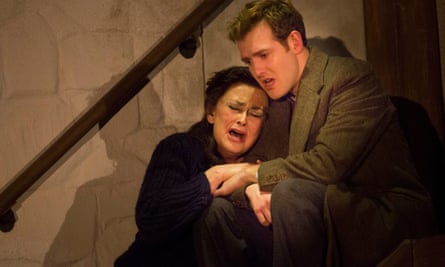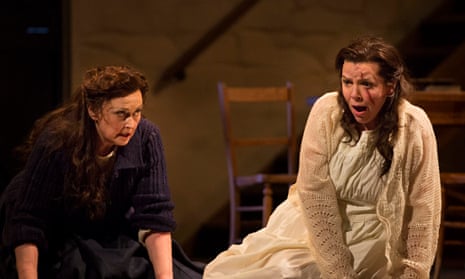“Don’t abandon my joyful stepdaughter,” Kostelnička implores the rakish Števa at the heart of Janáček’s desperately harrowing opera. But Števa walks away, disowning his baby and leaving its mother, Jenůfa, with options that are anything but joyful in a society whose women pay for mistakes beyond their due.
Annilese Miskimmon’s intelligent and sensitive new co-production for Scottish Opera and Danish National Opera relocates the drama from Moravia to the west of Ireland in 1918, where interior decorations and social dynamics feel unnervingly close to home. The first act plays out against the whitewashed exterior of a lifesize stone cottage; later the drama moves inside to a handsome period kitchen, astutely rendered down to the brown betty teapot. With heartbreaking empathy and an eye for subtle gesture, Miskimmon makes every character reasoned, every disastrous decision explicable, every relationship as complicated as real life. It’s like watching a troubled slice of your own family history.

The cast is compelling. Lee Bisset’s Jenůfa is dignified, earthy and powerfully sung; that she happens to be pregnant herself adds a poignant realism. Kathryn Harries’s Kostelnička is tormented, wise, authoritative, blazingly tender; her decision to kill the child for Jenůfa’s benefit is as moving as it is terrible. Peter Wedd’s frighteningly zealous Laca and Sam Furness’s recklessly immature Števa are both all too credible.
The conductor is Stuart Stratford, generally tipped to become Scottish Opera’s next music director. Some ensemble numbers were well paced, but I longed for more depth, agility and nuance from the orchestra – Janáček’s rhythms, especially, need an alacrity that Stratford didn’t muster, and too often the energy of a new passage seemed to generate among the singers and only subsequently transfer to the pit. Still, the strength of the singing and the production make this one of Scottish Opera’s finest offerings for some time.

Comments (…)
Sign in or create your Guardian account to join the discussion